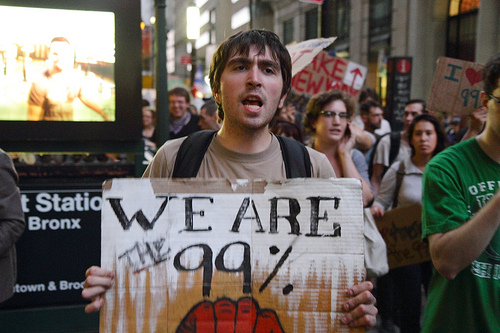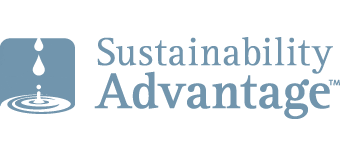3 Punchy Videos on How to Span the Wealth Chasm

The Occupy / We Are the 99% movements have awakened many people to unsustainable economic inequities. There has always been a gap between the haves and the have-nots. It’s the widening of that wealth chasm during a recession and the co-opting of the political process by corporations that has aroused recent global protests.
Protestors are accused of being heavy on criticism and light on solutions. However, when they put forward well-thought-out proposals, they are ridiculed for being naïve and out of touch with “reality.” That is, they don’t have any good ideas. Oh, really? These three videos cleverly capture concrete proposals that would help address the underlying causes of unjust and dangerous wealth inequities.
1. Bill Nighy video backing a Robin Hood tax on banks
A Robin Hood Tax or Tobin Tax has been discussed for years. To quote the Robin Hood Tax site, “The Robin Hood Tax is a tiny tax (0.05%) that would be levied on all financial market transactions in order to raise resources for fighting poverty and climate change at home and abroad. It would cover financial transactions traded through stock exchanges, futures exchanges or any other facility established for the purpose of trading (“exchange trading”) by financial market actors.”
It’s a no-brainer. It would painlessly raise about $650 billion dollars that would benefit everyone, but financial institutions have consistently opposed it as interfering with their right to unfettered profits. British actor Bill Nighy’s comedy skit shows an interview with a fictitious banker on the Robin Hood Tax. Does it look like a good idea?
2. Story of Broke
In keeping with the tone and style of her Story of Stuff and other earlier videos, Annie Leonard is working on a new Season 2 series, looking at the stories behind the Story of Stuff. The Story of Broke is one of them. As its November 7, 2011, press release says: “The Story of Broke challenges those who tell us that America—the wealthiest country in the world and a country in which the wealthiest among us are doing exceptionally well—is penniless and incapable of paying its bills, let alone making investments in a more sustainable and fair economy.
The film calls for a shift in government spending away from support for the ailing “dinosaur economy” and toward investments in the 21st Century green economy.” Governments are not broke; they’re just squandering tax revenues on the wrong things. The video makes specific recommendations about redirecting numerous perverse subsidies, making polluters pay, and internalizing externalized corporate costs. These measures would help close the wealth chasm. Do they sound like good ideas to you?
3. Story of Citizens United vs. FEC
A second video in the Story of Stuff Project’s Season 2 series was released on March 1, 2011. Here are excerpts from the press release for Story of Citizens United vs. FEC: “Leonard, who directs The Story of Stuff Project, was inspired to make the film by the disastrous 2010 U.S. Supreme Court decision in Citizens United v. FEC that permitted corporations to spend freely to influence American elections. The 8-minute film … places corporate influence—not bad politicians—at the heart of Americans’ low confidence in the political process.
The movie explores the history of the American corporation and corporate political spending, the appropriate roles of citizens and for-profit corporations in a democracy and the toxic impact the Citizens United decision has already had on our political process. It ends with a call to amend the U.S. Constitution to confirm that people—not corporations—make the decisions in a democracy.” It would ensure that people, not the military-industrial network of corporations masquerading as people, are in charge of our democracy. Does that sounds like a good idea?
In case Canadians think that the two “Story of …” videos only apply to the U.S., the fundamentals are still relevant, though to different degrees. Plus, if Canada’s policies on issues like climate change are in lock step with America’s, then we have a vested interest in how corporations are overly influencing Congress and skewing government support toward their self-interests.
So when people dismiss the Occupiers as whiners without ideas, the ideas are there. It’s the political will to listen and act that is missing.
Please feel free to add your comments and questions using the Comment link below. For email subscribers, please click here to visit my site and provide feedback.
Bob




Comments are closed.